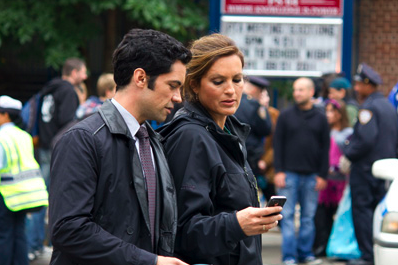This article refers to sexual assault and rape. While it is not explicit, reader discretion is advised.
Does anyone else who started watching “Law and Order: Special Victims Unit” when they were just 10 years old now look back on it with slight concern, or is it just me? The series is on NBC, so one might presume that it is a little more palatable to a general audience, but the show, which follows detectives prosecuting sex crimes, is thematically quite intense.
Growing up in a small, quiet town, my basic cultural understanding of the legal and criminal justice system was completely informed by the media that I consumed. I was fairly mature as a child and extremely curious. I watched “SVU” marathons during summer vacation, spurring an interest in law, fairness and justice. I found crime and mystery fascinating — and let’s be real, Law and Order: SVU is simply a great show.
Sure, “SVU” was an entertaining and dependable procedural. While still a bright-eyed girl, I watched as Detective Olivia Benson (Mariska Hargitay) arrested rapists and pedophiles and Assistant District Attorney Alexandra Cabot (Stephanie March) presented an airtight case to the jury. In every episode, justice was served. “SVU” is, as Rolling Stone put it, “a cultural institution,” but that does not come without consequence.
I feel uneasy when I look back on my childhood fascination with crime television because I now understand the insensitivity of using sexual violence as a vehicle to move a plot forward in a story. While “SVU” writers have spent over the past two decades improving how sexual assault is handled in the series, a show with that many episodes is bound to misstep every so often. It can be discouraging, especially as so many real-life victims of sexual assault struggle to obtain justice or closure.
On the other hand, this is probably why “SVU” can be used as a grim sort of escapism. Violence still occurs, but at least there is some semblance of consequence. Writer Laura Barcella put it perfectly in a Rolling Stone article from 2018: “[P]art of the reason it feels so eerily comforting is because it serves as a sort of parallel universe where victims of unspeakable crimes are believed and often find justice,” she wrote. “Of course, that’s not how things unfold for most real-life survivors, many of whom never report their attacks at all.”
Rape and sexual assault are not always taken seriously by police, and in investigations, some prosecutors often choose to not press charges. The small percentage of cases that do go to trial do not usually result in a verdict equal to the crime. Brock Turner, infamous for spending only three months in incarceration for attempting to rape an unconscious woman, is an infamous example of this failure of the American criminal justice system. Leniency for rapists should not be allowed, but it is, unfortunately, more common than we’d like it to be.
American media teaches viewers that the police are always the good guys, always worthy of trust. It sends a message that people can be judged by appearances — that if somebody looks a certain way they are more likely to commit crimes, or that some deserve the crimes perpetrated against them while others should be treated leniently for the crimes they commit. The sheer number of crime procedurals on TV speaks to the subconscious pressure to accept these racial undertones.
Blind faith in a system that doesn’t keep its promises will only hinder us as a society. Everyone is vulnerable to ideology, and we can’t have a full, informed perspective when operating from a place of restricted beliefs. While there are a lot of people — maybe even a majority — who go into law enforcement because they desire to help others, there are also people who are less well-intentioned. When those in charge of protecting communities don’t hold a tolerant and nuanced perspective, marginalized people get hurt.
Statistically, there are nationwide racial disparities throughout the criminal justice process, from traffic stops to sentencing. People of color — especially those who are black or indigenous — are targeted more often than white Americans, even though these groups commit about the same rate of crime. The current legal systems in place originated in a society built on slavery, colonization and violence. As long as they continue to exist as they do, the legal and justice systems are not designed to function for a large percentage of the population.
Poverty exacerbates these struggles with justice. Those who are both people of color and poor will experience compounding layers of discrimination and hardship because of their intersecting marginalized identities. If they are targeted because of their race and only have access to a public defender, jail time seems a lot more likely. A wealthy person can afford a private attorney who devotes hours to their defense, whereas a person with a public defender may only get 15 minutes to plan theirs. The Salt Lake Tribune recently reported on the overwhelming caseload Washington County public defender Edward Flint. Flint has 287 active cases and only minutes to speak with his clients before they were put in front of a judge.
When I get pessimistic, I remind myself that are many hardworking people and groups around the country, working inside and out to improve the criminal justice system. Whether it is in their local or state governments or at the federal level, many activists are committed to change. They understand that if our country continues to run on antiquated, racist laws and court systems, we will never progress.
To those who are lucky enough to comfortably view the criminal justice system as it is portrayed in the media, I encourage you to do a little more digging. Social media, especially Twitter, has helped to dramatically educate people about the realities of our country. We have more access to information than we’ve ever had before. It is our responsibility as Americans to use that information to find a better way.



